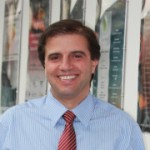 |
Professor Nuno Alves
CDRSP, Polytechnic Institute of Leiria, Portugal |
| Nuno Alves has a MSc and a PhD from Lisbon University on Mechanical Engineering: Computer Vision. He is the Director of the Centre for Rapid and Sustainable Product Development (CDRSP) and Associate Professor on Computer Modelling and Simulation at the Polytechnic Institute of Leiria (IPL). He is/was supervisor/co-supervisor of thirty MSc/MEng Students. He has co-edited four books, authored and co-authored 100+ papers published in books, international journals, international conferences and patents.Nuno Alves is a reviewer of the Virtual and Physical Prototyping Journal, Bioinspiration and Biomimetics Journal, International Journal of Vehicle Design, Assembly Automation journal and several International Conferences. His research interests are mainly on Reverse Engineering/Design, Computer Aided Design/Engineering, Virtual and Physical Prototyping, Image-based Modelling Systems, Multidimensional (nD) Modelling, Biomanufacturing. | |
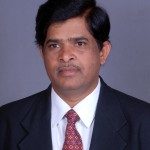 |
Professor Mahadevappa Karidiraganavar
Karnatak University, India |
| Dr. Mahadevappa Y. Kariduraganavar obtained his Master Degree in 1988 and Doctoral Degree in 1993 from Karnatak University, Dharwad. He joined Flora International Ltd., Bangalore as Manager (Operation). Prior to this, he also working as Research Assistant Grade-I In the Institute of Wood Science & Technology, Bangalore. In 1997, he joined Department of Chemistry, Karnatak University, Dharwad as Lecturer and was subsequently appointed as Professor of Physical Chemistry in 2007. He did his Post-Doctoral study during 2007-2008 under the prestigious Commonwealth Fellowship Program at J.J. Thomson Physical Laboratory, University of Reading, UK. He also established a Collaborative Research Program with the University of Reading, UK. Dr. Kariduraganavar was participated as a Panel Expert at the International Conference held at Bangkok, Thailand in 2011. In 2002, he attended and presented paper in International Euromembrane Conference held in Londod, UK. During this period, he gave a lecture on Ion-Exchange Membranes for Electrodialysis Applications at Imperial College, London. In 2013, he presented a paper in International Conference held at Dubai. During 2015, he visited Centre for Rapid and Sustainable Product Development (CDRSP), Portugal along with 3 of his Ph.D students as Visiting Professor and worked on Tissue Engineering for Bone Regeneration and Shape Memory Polymers. | |
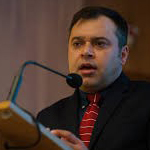 |
Professor Artur Mateus
CDRSP, Polytechnic Institute of Leiria, Portugal |
| Artur Mateus is an Associate Professor of Mechanical Engineering Department, on Rapid Tooling and Manufacturing, at the Polytechnic Institute of Leiria (PIL), since 1997. Also is Vice-Director of the Centre for Rapid and Sustainable Product Development at the Polytechnic Institute of Leiria (PIL). He is the Administrator of an Incubator for startups, OPEN (Marinha Grande – Portugal). He was a research supervisor of Rapid Tooling & Manufacturing at Vangest Group (Marinha Grande – Portugal) between 1999 to 2001.Artur Mateus has a PhD in Polymer Physics from Reading University (UK), a MSc from the Technical University of Lisbon (Portugal) and a first degree in Mechanical Engineering from the University of Coimbra. He has co-edited three books, authored and co-authored more than 70 papers published in books, international journals, and proceedings of international conferences. Artur Mateus has participated in more than 60 Research Projects, national and international, in consortium with companies and firms related to Rapid Tooling and Manufacturing, rapid design and advanced materials processing. |
|
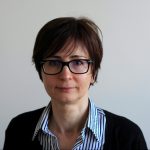 |
Professor Oana Ghita
University of Exeter, United Kingdom |
| Prof. Oana Ghita is an Associate Professor in Materials Science and Manufacturing. She has also the role of Deputy Director of the Exeter Advanced Technology (X-AT) and the Centre for Additive Layer Manufacturing (CALM) at University of Exeter. She started her career as a Research Fellow at Cranfield University- Royal Military College of Science, in the Sensors and Composites Research Group and then at Exeter University. Her research is focused on development of novel and alternative materials using efficient manufacturing, recycling and remanufacturing of clean manufacturing waste (in particular thermoset and thermoplastics, high performance composites) with emphasis on understanding the relationship between molecular structure/morphology, re-manufacturing and desired final properties. Under this research theme, she has secured over £3million funding in industry research programmes. One example is the Centre for ALternative MAterials and REmanufacturing Technologies (CALMARE), a Business Technology Centre which engaged sucessfully with over 150 businesses.
In recent years, her research expanded towards a new range of high performance advanced composites based on high temperature polymers and new emerging manufacturing processes such as Additive Manufacturing. Her current research into High Temperature Laser Sintering (HT-LS) is focused on Poly Aryl Ether Ketone (PAEKs) polymers as well as composites (glass, graphatised carbon, ceramic – fibres and fillers and CNTs reinforcement). She has also been involved in the development of in-line monitoring sensors and novel instrumentation for efficient material use and reduction of manufacturing waste (near IR and Raman spectroscopy, combined NIR/Raman-thermal analysis). |
|
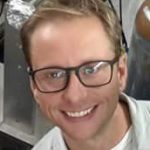 |
Professor Jules A.W. Harings
Maastricht University, Netherlands |
| Prof. Jules A.W. Harings is an asst. Prof. Macromolecular Physics & Technology at Maastricht University. He attained his PhD in Polymer Technology from Eindhoven Technical University under supervision of Prof. P.J. Lemstra and Prof. S. Rastogi in 2009. Thesis title: “Shielding and deshielding of amide-based (macro)molecules”. He spent four years as an industrial Research Scientist and Project Leader in fibre physics and new product development at Teijin Aramid, where he received the Teijin global best R&D award in 2011. In 2013, he returned to academia at Maastricht University. His research focuses on studying, understanding and technically tailoring/exploiting the behaviour of macromolecules from nano- to macroscopic length scales, envisioned in the research topics, comprising (i) molecular design for high performing biomedical polymers in 3D printing and regenerative tissue engineering, (ii) molecular design of polymer and process specific nucleating agents, (iii) controlling structure evolution of polyamides towards bio-inspired functionalities via molecular design and aqueous processing. Via these research lines he aims to contribute to closing and timing carbon cycles limiting CO2 accumulation (biobased) and global plastic pollution (bio-inspired), improving clinical care and long term health (biomedical); securing quality of life. | |
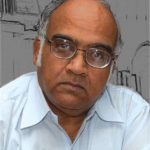 |
Professor Swaminathan Sivaram
Indian Institute of Science Education and Research |
| Swaminathan Sivaram is a polymer chemist, mentor and science manager of distinction. He is presently an INSA Senior Scientist and Honorary Professor at the Indian Institute of Science Education and Research, Pune, India. Prior to this he held the position of CSIR Bhatnagar Fellow (2010-15) and J.C. Bose National Fellow of the Department of Science and Technology (2007-15) at CSIR-NCL. He served as the eighth Director of National Chemical Laboratory (NCL), one of the largest publicly funded research and development laboratories devoted to chemical sciences from 2002-10. An alumnus of IIT-Kanpur, he received his PhD in Chemistry from Purdue University, USA. He was a Research Associate at the Institute of Polymer Science, University of Akron, USA before returning to India to pursue his professional careerTop of Form at the Research Centre of Indian Petrochemicals Corporation Ltd., at Vadodara in 1973. In 1988, he moved to NCL as Head of the Polymer Chemistry Division.
Dr. Sivaram has held leadership roles in R&D in, both, academia and industry. He has over forty years of experience in basic research, process/product R&D and S&T management, both, in industry and academia. He is widely recognized for his contributions to polymer science, technology development, institution building and management of innovation in publicly funded organizations. The President of India honored Dr. Sivaram with the coveted civilian award, Padma Shri, in 2006. He was awarded the Doctor of Science (honoris causa) by Purdue University, USA in 2010 for his exceptional attainment and merit. Dr. Sivaram is a recipient of numerous professional honors and recognitions in India. He is an elected Fellow of all the learned academies of science and engineering in India, namely, Indian National Science Academy, New Delhi, Indian Academy of Sciences, Bangalore, National Academy of Sciences, Allahabad and Indian National Academy of Engineering, New Delhi. He is also an elected Fellow of the Academy of Sciences for the Developing World, Trieste, Italy (TWAS), Fellow of the International Union of Pure and Applied Chemistry (IUPAC) and Royal Society of Chemistry, UK. He has lectured widely around the world and has been Visiting Professor at the University of Bordeaux, France, Free University of Berlin, Germany and H.A. Morton Distinguished Professor of Polymer Science at the University of Akron, Ohio, USA . He has mentored the Ph.D. thesis of 36 students, over a dozen post-doctoral fellows and published over 210 papers in peer reviewed scientific journals. He is cited as an inventor in 49 granted European and US as well as 52 Indian patents. Several of his patents have been licensed to companies worldwide. He has edited two books, authored one book and serves on the Editorial Board of several national and international journals in chemistry and polymer science. He has lectured widely around the world and has been visiting professor at the University of Bordeaux, France, Free University of Berlin, Germany and H.A. Morton Distinguished Professor of Polymer Science at the University of Akron, Ohio, USA. Dr. Sivaram serves as the Chairman of the Scientific Advisory Committee, Vyome Biosciences Ltd., New Delhi and a Member of the Scientific Advisory Council of Indian Oil Corporation R&D, Faridabad, Apollo Tyres, Gurgaon, HLL Life Care Ltd, Thiruvananthapuram and Asian Paints Limited, Mumbai. He is a member of the Board of Directors of Asian Paints India Limited, Mumbai, Apcotex Industries Limited, Taloja, GMM Pfaudler Limited, Anand, Deepak Nitrite Limited, Vadodara and Supreme Petrochemicals Limited, Mumbai. He was the founder-Chairman of the Board of Directors of Entrepreneurship Development Center, Pune (Venture Centre), a company set up to drive innovation and create wealth out of cutting edge science and technology which has grown onto one of India’s finest technology business accelerator with a bouquet of services to translate science into market facing applications He is a much sought after consultant to many leading chemical industries in India and abroad. Dr. Sivaram’s research interest concerns polymer synthesis (cationic, anionic, GTP, Ziegler Natta, free radical and step growth polymerizations), high performance polymers, surface chemistry of polymers, porous polymers for energy related applications, biodegradable polymers, polymers from renewable resources, organic-inorganic hybrids and nanocomposites and structure-property relationship in polymers. |
|
 |
Professor Sean Murphy
Wake Forest Institute for Regenerative Medicine, USA |
| Dr. Sean Murphy received his Bachelors degree in Molecular Biology from the University of Western Australia in 2006 and his PhD in Stem Cell Therapy in 2012. His thesis work focused on developing perinatal stem cells as a therapy for lung disease and contributed to an ongoing Phase I clinical trial for the treatment of bronchopulmonary dysplasia (BPD) in preterm infants. Dr. Murphy joined Wake Forest Institute for Regenerative Medicine in 2012 as a Postdoctoral Fellow and became an Assistant Professor in 2015.The goal of his current and future research is to apply regenerative medicine and tissue engineering strategies to develop new clinical treatments for lung disease.
These strategies include cell therapies to restore normal function to lung tissue and minimize inflammation and scarring associated with disease. Diseases such as bronchopulmonary dysplasia and cystic fibrosis are often diagnosed before, or shortly after birth, so an effective therapeutic intervention at an early stage could prevent the onset of disease. Perinatal stem cells, derived from perinatal tissues such as the amniotic fluid, placenta and placental membranes, have potent immune-modulatory properties and multipotent differentiation potential. His work has shown that perinatal cells are an effective anti-inflammatory therapy for the treatment of lung disease. This work has culminated in a Phase I clinical trial evaluating perinatal cells for the treatment of bronchiopulmonary dysplasia in pre-term infants. For patients where early intervention is not possible, such as those with end stage lung disease, there are currently few treatment options other than transplantation. To overcome this challenge, he has developed strategies to generate tissue engineered airway tissue for disease modeling, drug testing and transplantation. This research has included the development of techniques and tools such as patient-specific induced pluripotent stem cells, airway and lung tissue deceullarization, extracellular matrix hydrogels, and 3D bioprinting technology. The outcomes of this multidisciplinary approach includes the fabrication of patient specific airway constructs for transplantation, “disease-in-a-dish” approaches to cystic fibrosis disease modeling, and microfluidic lung-on-a-chip organoids for the high throughput screening and evaluation of novel drugs and small molecule therapies for patients with lung disease. The therapeutic value of perinatal tissues is widely recognized, with the first modern application of amniotic membrane for wound covering and reconstructive purposes first described in the early 20th century. However, while the use of amnion membrane in clinical settings is advantageous, it is a somewhat difficult material to incorporate into routine use. Limitations included difficulty to handle the thin sheets without folding or tearing, and the requirement for sutures or adhesives to hold the membrane in place over the wound. To address these limitations, he has developed an amniotic membrane based biomaterial that can be easily delivered to full thickness wounds or burns either as a powder or hydrogel. Amniotic membrane-derived biomaterials are easy to manufacture, store and apply to full thickness wounds. In our preclinical studies our therapy produced significantly faster wound healing compared to the current standard of care, with a histological and extracellular matrix composition most similar to healthy skin. He is currently planning a Phase I clinical trial for evaluation of material to treat burns and wounds. |
|
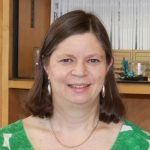 |
Professor Elizabeth Tanner
University of Glasgow, Scotland |
| Professor Liz Tanner joined the University of Glasgow in August 2007 as Professor of Mechanics of Materials and Structure and Bioengineering, subsequently Professor of Biomedical Materials. From 2011 – 2015, Liz was the Head of the Biomedical Engineering Teaching Division, with responsibility for the new BEng and MEng degrees in Biomedical Engineering which she developed and which started in September 2010 and the MSc which started in September 2014. These BEng and MEng degrees were the first undergraduate degrees in Biomedical Engineering in Scotland.
Her first degree was in Engineering Science at the University of Oxford followed by a DPhil when she was based in the Nuffield Orthopaedic Centre, Oxford. She was working on the assessment of movement at the fracture site in patients with tibial fractures. She then joined the Department of Materials at Queen Mary University of London, progressing from research assistant through to, in 1998, being appointed Professor of Biomedical Materials. The projects were on the development of bone replacement and augmentation materials. She was also Associate Director of the IRC in Biomedical Materials from 1998 to 2001 and Dean of Engineering from 1999 to 2000. She has been a Visiting Professor in the Department of Orthopaedics, Lund University since 1998. In 2004 she was elected Fellow Biomaterials Science and Engineering (FBSE) awarded by International Union of Societies in Biomaterials Science and Engineering. Between 2001 and 2009 she was a member of the Executive Committee of the European Society for Biomaterials and was the Secretary 2005-2009. In 2006 she was elected Fellow of the Royal Academy of Engineering, where she has served on committees including the UK Focus on Biomedical Engineering and Research and Secondments Committee. She is currently a Trustee of the Royal Academy of Engineering and Chair of the Proactive Membership Committee. In 2015 she was elected a Fellow of the Royal Society of Edinburgh. In the January 2016 New Year’s Honours List she was made Officer of the Order of the British Empire (OBE) and in June 2017 she will collect a PhD (Hon Caus) from Faculty of Medicine, Lund University, Sweden. She is a member of the Editorial Boards of various biomaterials and biomechanics journals including being an Associate Editor of Proceedings of the Institution of Mechanical Engineers, Part H: Engineering in Medicine. Her Key Note lecture is entitled “Optimising Bioactive Composites for Controlled Deposition” |
|
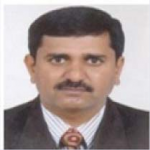 |
Professor Vedamurthy A B
Karnatak University, India |
| Prof. Vedamurthy completed his M.Sc., M.B.Tech and Ph.D from Gulbarga He has 16 years of teaching and administrative experience has held many positions as Reader, Professor, Director and Principal at The Oxford College of Science, Bangalore from 2000 to 2013. Presently he is the Professor and Chairman, at the Department of Biotechnology and Microbiology, Karnatak University, Dharwad. He is also the Coordinator of new established Innovation and Incubation Centre at Karatak University, Dharwad. Currently he is guiding 8 Ph.D. students at the Department of Biotechnology and Microbiology, Karnatak University, Dharwad. He has vast research experience in the field of Plant Biotechnology, Nanotechnology, Phytochemistry, Pharmacology, Secondary Metabolites form Fungi etc. He has published more than 60 research articles in reputed national and international journals and he also has published a book for under graduate students- Biotechnology IV. He is recipient of Best Research paper Award instituted by Karnatak University, Dharwad for the year 2015. He is the recipient of many prestigious awards such as Elected Fellow Member of National Environmentalists Association (FNEA), Fellow Member of International Society of Biotechnology (FISBT) and as a co-author in many oral presentations at national and international conferences. He is also reviewer of several scientific Journals such as Elsevier, Springer, Willey etc. He visited several oversees counties for scientific meetings such as Austria, Germanay, Czek Repulic, Malasia, Srilanka, Thailand and Omen. He is the main source behind getting research funding of Rs. 1.8 Crores at the Department of Biotechnology to BT finishing School from Govt. of Karnataka at The Oxford College of Science, Bangalore. Presently he is investigator in DST and VGST funded projects at the Department of Biotechnology and Microbiology, Karnatak University, Dharwad. He also a member of many scientific communities such as Life Member, Indian Science Congress Association , Kolkata . Life Member, National Environmentalists Association , Life Member, International Society of Biotechnology, Life Member, Association of Biotechnology and Pharmacy , Treasurer (Elected), Indian Science Congress Association, Bangalore Chapter, Member, Society of Cytologists and Geneticists, India (founded in 1965). He is also contributing as research consultant at various institutions such as Reva Institute for Science & Technology Studies, Bangalore, Bio-nymph Life Sciences Pvt. Ltd., Bangalore, Institute of Bioscience & Molecular Biology, , Bangalore, Narayana Hrudayalaya College of Science, Bangalore. | |